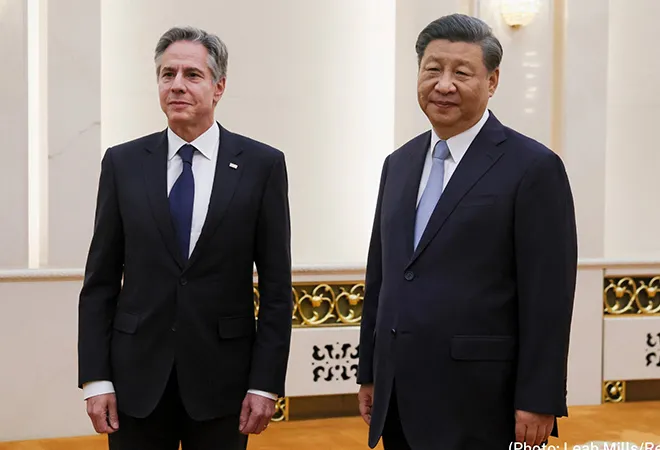-
CENTRES
Progammes & Centres
Location
Finding common ground could contribute to more cooperation, but achieving this will require compromises and sustained engagement from both sides

America’s senior-most diplomat Antony Blinken landed in Beijing on 18 June to meet China’s top leadership, making it the first head of the State Department to come visit in nearly five years. The Beijing sojourn comes at a time when there is growing apprehension that the tensions between the two powers could escalate into a military confrontation, especially over the Taiwan issue, where presidential elections are scheduled in 2024. The meeting between Jake Sullivan and Wang Yi in Vienna in May proved critical in their effort to “reestablish standard, normal channels of communications”, subsequently leading to the current visit.
The visit by Antony Blinken to the People’s Republic of China (PRC) marked a critical juncture in the deteriorating bilateral relations between the two nations. With tensions high since the ‘spy balloon’ incident, Blinken’s motivation was to emphasise the importance of maintaining open lines of communication and preventing misunderstandings that could lead to a potential conflict. Despite growing tensions, the Biden administration’s strategy has been to keep China engaged and ‘de-risk’ bilateral relations. This is despite China declining an invitation for Minister of National Defense Li Shangfu to meet with U.S. Defense Secretary Lloyd Austin on the side-lines of the Shangri La Dialogue on 2-4 June this year.
The trip was undergirded with the necessity of managing the competition between the two nations while acknowledging the gravity of unresolved disputes such as Taiwan, economic disagreements, and human rights concerns.
The latest visit aimed to address several pressing issues, including the risk of minor incidents escalating into a full-fledged conflict, issues of trade, human rights and Taiwan. The trip was undergirded with the necessity of managing the competition between the two nations while acknowledging the gravity of unresolved disputes such as Taiwan, economic disagreements, and human rights concerns. At the heart of Secretary Blinken’s visit to China has been the strategy of ‘de-risking’ as opposed to decoupling, on the lines of the strategy agreed by the G7 countries. Yet, the visit failed to yield any substantive results and the US remains poised in its relations with China to ‘invest, align, and compete’.
During Blinken’s interactions with the Chinese leadership, the issue of Taiwan featured prominently along with other problems such as America’s retaliatory trade and technological curbs. China’s Foreign Minister Qin Gang, who till recently was Beijing’s envoy in Washington, assessed that Sino-US relations were at the lowest point since the establishment of diplomatic ties. Wang Yi, who heads the Communist Party of China’s Central Foreign Affairs Commission, blamed the US for this nadir, blaming inappropriate perceptions of China in America and the promotion of the “bogey of a Chinese threat”. Wang, who is Chinese President Xi Jinping’s foreign policy advisor, urged Blinken to stop evaluating China from a “Western prism” where nations that accumulated strength sought to establish their hegemony. Wang figuratively drew China’s red lines, urging the Biden administration to halt its technological containment and interference in its internal affairs. Referring to Taiwan, Wang emphasised that national unity was the core of core interest and also the CPC’s mission, pressing the US government to abide by the “One-China” principle.
The American assessment of the Blinken trip seems publicly optimistic as evidenced by President Biden’s praise that it was “a hell of a job”, and that things were moving in the right direction. However, the debates in Chinese academia tell a different story of Blinken to Beijing. Zhang Zhixin from the China Institutes of Contemporary International Relations has argued that unless hostility between the two nations is eliminated, no amount of negotiations will succeed.
China’s Foreign Minister Qin Gang, who till recently was Beijing’s envoy in Washington, assessed that Sino-US relations were at the lowest point since the establishment of diplomatic ties.
Chinese thinking differentiates between the previous US presidential administrations and how it affected their policy. There is a sense that under pressure from the Global Financial Crisis of 2009, the US side was ready to cooperate on issues like climate change with China. However, there is a belief that since 2016, the general direction in the American strategic circuit was to adopt a “hard-line” approach towards China that later transmogrified into a policy to contain its “aspiration” in the Trump era, while “dialogue and cooperation” were seen as a weakness. In his paper, Zhang asserts that the direction of the Biden administration’s China policy has been to exacerbate a new Cold War due to American domestic political considerations.
Wu Xinbo, Director at Fudan University’s Center for American Studies, who visited the US recently, said that China was not very optimistic about Sino-US relations as in the past, and assesses there may not be any breakthroughs in Sino-US relations. However, Wu says that America Inc is unhappy with the impasse in US-China relations and that business people favour an improvement in relations with respect to bilateral trade. This reveals that Chinese scholars in America are leveraging their clout with big businesses to push for the normalisation of relations at a time when there is the anticipation of US-India friend-shoring and technology transfers that may benefit India.
As a former envoy to the US, Qin greatly understands these cross-currents in the Sino-American dynamics and has pushed for exchanges in the cultural and educational sphere to improve relations. For once, the Chinese will be reading the tea leaves to gauge America’s stand. One key indicator will be how current political discourse in America shapes the US-China Science and Technology Agreement, which has been the foundation of cooperation between the two and greatly enhanced China’s technology base. Chinese policy-makers believe that America’s approach to contain China has dented the nearly four-decade-old bilateral pact on science and technology and will assess the future of US-China relations from how negotiations take place with respect to the deal’s renewal. The US-China relations face a rocky road ahead.
Chinese policy-makers believe that America’s approach to contain China has dented the nearly four-decade-old bilateral pact on science and technology and will assess the future of US-China relations from how negotiations take place with respect to the deal’s renewal.
Human rights issues have been a longstanding point of contention between the US and China. Blinken’s visit provided an opportunity to raise concerns about human rights abuses, particularly in relation to the situation in Xinjiang, Tibet, and Hong Kong. In the area of trade, the US seeks to hold China accountable for unfair trade practices, promoting transparency and adherence to international norms. However, finding a balance between human rights concerns and other strategic interests is a complex challenge.
Blinken’s visit to China also aligns with the US’s broader strategy of multilateral engagement. As the world becomes increasingly interconnected, addressing global challenges necessitates cooperation among nations. While the US and China may be competitors, they also share common interests in areas such as climate change, nuclear non-proliferation, and global health. Blinken’s discussions included some of these opportunities for collaboration on these global issues. Establishing a framework for dialogue and cooperation in multilateral forums can help manage competition and prevent conflicts.
The economic interdependence between the US and China adds a complex dimension to their strained relationship. Despite their numerous disagreements, both countries recognise the significance of their economic ties and the potential consequences of a complete breakdown. The discussions between Blinken and Chinese officials likely involved economic disagreements, such as trade imbalances and market access. Managing these economic frictions while addressing broader geopolitical concerns is a delicate balancing act. The outcome of the talks will have implications for global trade, investment flows, and economic stability. Finding common ground in economic matters could contribute to a more stable and cooperative relationship, but achieving this will require compromises and sustained engagement from both sides.
Blinken’s visit provided an opportunity to raise concerns about human rights abuses, particularly in relation to the situation in Xinjiang, Tibet, and Hong Kong.
The only positive outcome between the two countries was on the issue of curbing the flow of precursor chemicals for fentanyl—a synthetic drug, in an effort to arrest the opioid crisis in the US through a bilateral working group. China’s assurance of not providing lethal arms support to Russia could be counted as another takeaway. Beyond this, the absence of a clear strategic outcome from the talks cuts both ways. On the positive side, it may well be a starting point for future engagements, while on the negative side, the visit did little to assuage concerns of retaliatory policies on trade and Taiwan. Furthermore, the visit failed to yield any breakthrough in restoring military-to-military talks between US and China. Nevertheless, the visit’s importance lies in its rather constructive note hit by both sides in their respective post-visit statements which, if anything, hinted at the possibility of engagements in the future.
The US-China relations remain central to the stability of the global order, even as the ongoing war in Europe has provided geostrategic rationales for realignment to many countries of the world. As such, China’s assurances on stability and steering clear of major disruptions remain essential for US interests.
Vivek Mishra is a Fellow with the Strategic Studies Programme at the Observer Research Foundation
Kalpit A Mankikar is a Fellow with Strategic Studies Programme at the Observer Research Foundation
The views expressed above belong to the author(s). ORF research and analyses now available on Telegram! Click here to access our curated content — blogs, longforms and interviews.

Kalpit A Mankikar is a Fellow with Strategic Studies programme and is based out of ORFs Delhi centre. His research focusses on China specifically looking ...
Read More +
Vivek Mishra is Deputy Director – Strategic Studies Programme at the Observer Research Foundation. His work focuses on US foreign policy, domestic politics in the US, ...
Read More +